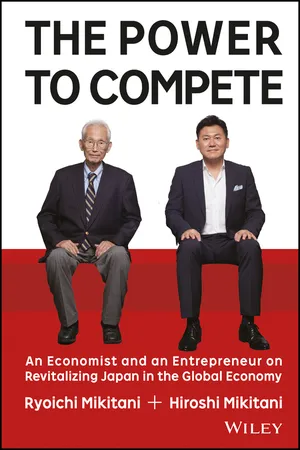
The Power to Compete
An Economist and an Entrepreneur on Revitalizing Japan in the Global Economy
- English
- ePUB (mobile friendly)
- Available on iOS & Android
The Power to Compete
An Economist and an Entrepreneur on Revitalizing Japan in the Global Economy
About this book
"If you're as interested in Japan as I am, I think you'll find that The Power to Compete is a smart and thought-provoking look atthe future of a fascinating country." - Bill Gates, "5 Books to Read This Summer" Father and son – entrepreneur and economist – search for Japan's economic cure
The Power to Compete tackles the issues central to the prosperity of Japan – and the world – in search of a cure for the "Japan Disease." As founder and CEO of Rakuten, one of the world's largest Internet companies, author Hiroshi Mikitani brings an entrepreneur's perspective to bear on the country's economic stagnation. Through a freewheeling and candid conversation with his economist father, Ryoichi Mikitani, the two examine the issues facing Japan, and explore possible roadmaps to revitalization. How can Japan overhaul its economy, education system, immigration, public infrastructure, and hold its own with China? Their ideas include applying business techniques like Key Performance Indicators to fix the economy, using information technology to cut government bureaucracy, and increasing the number of foreign firms with a head office in Japan. Readers gain rare insight into Japan's future, from both academic and practical perspectives on the inside.
Mikitani argues that Japan's tendency to shun international frameworks and hide from global realities is the root of the problem, while Mikitani Sr.'s background as an international economist puts the issue in perspective for a well-rounded look at today's Japan.
- Examine the causes of Japan's endless economic stagnation
- Discover the current efforts underway to enhance Japan's competitiveness
- Learn how free market "Abenomics" affected Japan's economy long-term
- See Japan's issues from the perspective of an entrepreneur and an economist
Japan's malaise is seated in a number of economic, business, political, and cultural issues, and this book doesn't shy away from hot topics. More than a discussion of economics, this book is a conversation between father and son as they work through opposing perspectives to help their country find The Power to Compete.
Frequently asked questions
- Essential is ideal for learners and professionals who enjoy exploring a wide range of subjects. Access the Essential Library with 800,000+ trusted titles and best-sellers across business, personal growth, and the humanities. Includes unlimited reading time and Standard Read Aloud voice.
- Complete: Perfect for advanced learners and researchers needing full, unrestricted access. Unlock 1.4M+ books across hundreds of subjects, including academic and specialized titles. The Complete Plan also includes advanced features like Premium Read Aloud and Research Assistant.
Please note we cannot support devices running on iOS 13 and Android 7 or earlier. Learn more about using the app.
Information
Chapter 1
The Power to Innovate
Japan Again
The Keys to Revitalizing Japan
- Efficiency of the country
- Innovation capability
- Operation capability
- Global expansion and market capability
- Brand power
Table of contents
- Cover
- Title Page
- Copyright
- Introduction: Japan Again
- Chapter 1: The Power to Innovate
- Chapter 2: The Power to Operate
- Chapter 3: The Power in Questioning Abenomics
- Chapter 4: The Power of the Low-Cost State
- Chapter 5: The Power to Succeed Overseas
- Chapter 6: The Power to Educate
- Chapter 7: The Power to Build Brand Japan
- Conclusion: What Is the Power to Compete?
- Epilogue
- Acknowledgments
- Index
- End User License Agreement